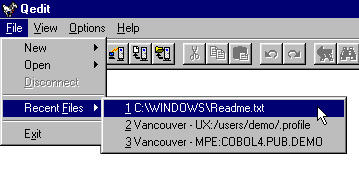Host files are also fully-qualified using the appropriate syntax for the host they reside on. They are prefixed by the Connection name. Qedit also keeps track of the options used at the last open i.e. Read-only or Force Unnumbered.

Previous Version | Qedit for Windows News | Next Version
| Qedit saves the name of the 16 most recently accessed files. You can then open one of
these files using the Recent Files command of the File menu.
The filenames are stored as fully-qualified names. For local files, the drive
letter and the complete path is displayed.
Host files are also fully-qualified using the appropriate syntax for the host they reside on. They are prefixed by the Connection name. Qedit also keeps track of the options used at the last open i.e. Read-only or Force Unnumbered. | 
|